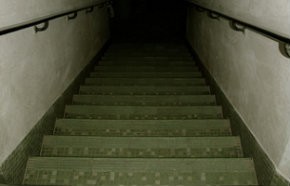Moving down in the world: Called to a smaller place
I’m sitting on Tamassee Knob, a large rock known for its height—1,762 feet above sea level is a surprising elevation for South Carolina. The scenic overlook is only a few miles from the town of Walhalla (pop. 3,500), where I’m a 55-year-old Lutheran pastor.
Tamassee means “Place of the Sunlight of God” in Cherokee, and the morning is filled with brilliant light as well as silence; there was only one other hiker on the trail this morning. In my day pack are a water bottle, banana, journal and Bible. I read from John 4 about the woman at the well and occasionally take a long slow sip of the distant views.
Read our latest issue or browse back issues.
I’m also only a three-hour drive from the bustle of downtown Columbia and the large congregation I served for nine years—but it feels light-years away. Many of my colleagues think of me as lost these days. What in the hell is Frank Honeycutt doing? is the question I heard in the days before I left a “destination church” (as the Alban Institute puts it) for a small, out-of-the-way congregation upstate. Even now I sometimes expect to hear God speak through the wind, asking the question once posed to Elijah: “What are you doing here?” (1 Kings 19:13).
In Open Secrets, Richard Lischer writes about his first appointment to a small Lutheran congregation in southern Illinois: “Of course I knew Christendom needed unstrategic little churches like this one, but I bitterly resented the bureaucrats who had misfiled my gifts, misjudged my obvious promise, and were about to place me in rural confinement.” Lischer came to realize the beauty of both place and call. I too am appreciating the beauty of this place and call, although, unlike Lischer, I was called to a smaller place from a larger place. It’s not the usual order of things.
I love the people of the Columbia congregation and am proud of its outreach. With the Salvation Army, we fed 150 homeless people seven nights a week. The services and concert music were majestic. I was part of a race and reconciliation group. (The Confederate flag no longer flies on top of the State House, but there were plenty of other issues to address.) Columbia was an interesting and challenging place to serve.
But something was missing. Our parish comprised multiple zip codes and several counties. I was in the car a lot and weary of the full-stop traffic jams on the interstate. I once hiked the Appalachian Trail from Maine to Georgia, and I longed for the open spaces of the mountains.
I focus again on the narrative from John 4, in which Jesus confronts the woman about her many husbands. The exchange between the two seems almost shockingly rude. Sandra Schneiders has noted that “husband” here is probably an allusion to various idolatries in the life of this woman, since multiple spouses would never have been ethically permissible in first-century Samaria. Perhaps John was referring to all of us who’ve had love interests other than Jesus, the true bridegroom. Was I doing the same thing when I contemplated a departure from Columbia? Was I elevating open spaces to a place of idolatry? Was I running from my call?
A few years back, when I was serving the city church, I began to have trouble keeping up with expectations. It was assumed that we’d see an ever-growing worship attendance, with growth measured in numerical success. I turned to the Bible in my confusion and noted that at times, after Jesus has described what it means to follow him, the crowd thins out. He is at the zenith of his popularity before he gives a sermon in Luke 14, but after the sermon the numbers drop. Will somebody give the guy a ten-second delay button so a handler can edit and airbrush his jarring words?
This is what led me to leave: many believed the beauty of our church building and charisma of our pastor should draw crowds. Many, it seemed to me, underestimated how jarring Jesus’ words sound in the political culture of a state capital.
The church in Walhalla has an old clock tower dating to the late 1850s. I climb it often for the view of the town, the church cemetery and Tamassee Knob. Up there, I can see the intricate clockworks tick off each measured second. A friend visited not long after I arrived in town. Kent is an artist who enjoys making small ceramic figures and hiding them along trails in national parks, on railroad river trestles or outside art museums. He and I climbed the church clock tower and hid a small Quasimodo figure in rafters made of massive timbers hewn from local logs by master German builders. I thought the old German Americans out in the graveyard might appreciate the hunchback presiding over their tower.
Ron Rash, a fiction writer and poet in this region, helps me understand my yearnings. In his poem “Under Jocassee,” he invites the reader to board a boat, row out into Lake Jocassee and then look down through the water. The reader sees a road appear, one that existed before the valley was flooded by a hydroelectric project. Then the reader sees, still through the deep, clear water, a woman walking beside a barn. She shivers as she moves through various farm chores. Looking up, she sees that a large cloud is casting the chilling shadow—and at the end of the poem the reader realizes that the shadow is cast by the boat in which he sits.
In Rash’s poem, layers of history bubble to the surface of the lake as well as to the reader’s mind. I was drawn back to a small town because history seems more readily accessible there, while the city always seems to be moving toward the future at breakneck speed. In the city there was little time for me to ponder or for Jesus to address me as he did the woman at the well—in layers, deep down. I felt as if I was always running from one thing or person to another. As Craig Barnes says in The Pastor as Minor Poet: “The work of Jesus Christ in our lives is to restore the divine image, which has become so distorted that it can no longer be recognized. The distortion came about by our attempts to cram other images into our souls, which made it impossible for us to remember who we were created to be.”
Of course, there are new challenges in Walhalla. The music ministry needs work. And after years of having a staff person in charge of youth ministry, I’m that youth minister in Walhalla. Financial and human resources aren’t as plentiful, and no one is readily available to cover for me when I go out of town.
But I’ve recovered the sense of measuring time and am slowly restoring a memory of who I was created to be. There is time to climb a clock tower and plant Quasimodo. There is time to chat with the proprietor of the Walhalla Steak House, where the best chicken in the region is served—but no steak. There is time to linger on the porch of worried parents on a weekday evening and talk about and pray for their son, a soldier in Afghanistan. There is time to lovingly ponder the word in morning and evening Bible studies (more people show up for class in this small town than in the city). There is time to stroll around town and pray for businesses that have fallen on hard times. There is time to write and make sense of ministry and my own oddness. There is actually time to walk to church from my house less than half a mile away.
And there’s time to visit Charles and Billie, a couple in their eighties who’ve been members at St. John’s for their 59 years of marriage. They live about ten miles from Walhalla on a beautiful piece of land at the end of a dirt road. In the early ’70s they invited fledgling bands to the “Charlie B Ranch.” Fleetwood Mac, Billy Preston, the Marshall Tucker Band, and Blood, Sweat and Tears played at Charlie B’s before anyone knew of them. Charlie and Billie showed me the old publicity posters. “There were about 15,000 people,” said Charlie, proudly. When I left, I stopped near the old stage in the pasture and imagined a young Stevie Nicks belting out “Landslide.”
Toward the end of Jesus’ encounter with the unnamed woman at the well, she “left her water jar and went back to the city,” witnessing to her neighbors. The Bible seems to have a consistent fondness for the city, but my pastoral witness is headed in the opposite direction—to an old man’s well-tended acreage; to the modest home of twin sisters Linda and Brenda, who dress exactly the same each day, right down to their jewelry (only in the South); to the mountain trailer of talkative, funny Dot, a novelist and former columnist for the Charlotte Observer; to 95-year-old violinist Louis, a former orchestra member who accompanies our hymns each Sunday morning. This is the pastoral landscape of Walhalla.
I take a slow sip from the water bottle. Before heading back to the car, I look once more at the vista I missed for almost a decade. I’m grateful to be in this place of the sunlight of God.







